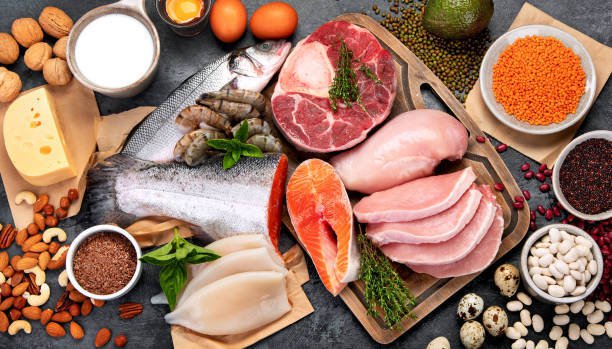Science
UK Diet Lacking in Key Nutrients: Selenium, Iodine, and Riboflavin

A recent analysis has revealed that many individuals in the United Kingdom are not consuming sufficient amounts of three essential nutrients: selenium, iodine, and riboflavin (vitamin B2). The findings, which stem from the Government’s National Diet and Nutrition Survey, indicate a worrying trend in dietary deficiencies that may not be widely recognized.
According to the survey published this year, deficiencies in these nutrients are part of a broader issue affecting the UK diet. The analysis highlighted that deficiencies in more commonly recognized nutrients, such as vitamin D, folate (vitamin B9), iron, calcium, and potassium, have also persisted. Bridget Benelam from the British Nutrition Foundation pointed out that the results suggest a national trend of unbalanced diets. The survey, which has been conducted periodically since 2016, shows a notable increase in deficiencies.
The shift toward plant-based diets, which often exclude meat and dairy, has been identified as a potential contributor to the growing number of deficiencies, remarked Dr. Emma Derbyshire, a public health nutritionist at the Health & Food Supplements Information Service.
The Importance of Selenium
Selenium is a mineral that plays a critical role in maintaining a healthy immune system. Yet, according to the latest survey, nearly half of UK adults are not meeting the recommended intake levels. Deficiencies in selenium can lead to several health problems, including increased susceptibility to infections, fatigue, muscle weakness, and poor sperm quality in men.
Food sources rich in selenium include meat, fish, eggs, Brazil nuts, lentils, and grains. Concerns have also emerged regarding the levels of selenium in British farmland, with some areas exhibiting lower-than-desirable levels. This poses a risk for crops that rely on the mineral for optimal growth.
Iodine: A Key Nutrient for Health
Iodine is another nutrient of concern, with approximately 13 percent of adults not consuming adequate amounts. The analysis tracked iodine levels in urine since 2013, showing a significant decline of 25 percent over the past decade.
Primarily found in seafood and dairy products, iodine is vital for producing the hormone thyroxine, which regulates metabolism and energy levels. Inadequate iodine intake can result in fatigue, and for pregnant women, it poses serious risks for their baby’s brain development. Dr. Derbyshire emphasized that low iodine levels could have long-term implications for future generations.
As the trend towards plant-based diets continues, many people opt for fortified plant milks. However, these often contain only minimal amounts of iodine, insufficient for health needs.
The Role of Riboflavin in Energy Production
Riboflavin, or vitamin B2, is crucial for energy metabolism, and deficiencies can lead to fatigue. The recent survey indicated that 15 percent of adults and a striking one-third of teenage girls are not consuming enough riboflavin. This vitamin is found in foods such as meat, eggs, dairy products, and certain green vegetables like spinach.
Benelam advised that individuals avoiding animal products should consider supplements to prevent malnutrition. “If you follow a balanced diet including all major food groups, you should be able to obtain most nutrients, with the exception of vitamin D,” she noted.
The analysis of these deficiencies was published in the medical journal Food and Nutrition Sciences, underlining a pressing need for public awareness regarding dietary balance and nutrient intake. As the landscape of food consumption evolves, particularly with the rise of plant-based diets, attention to these essential nutrients is critical for maintaining overall health.
-

 Health3 months ago
Health3 months agoNeurologist Warns Excessive Use of Supplements Can Harm Brain
-

 Health3 months ago
Health3 months agoFiona Phillips’ Husband Shares Heartfelt Update on Her Alzheimer’s Journey
-

 Science1 month ago
Science1 month agoBrian Cox Addresses Claims of Alien Probe in 3I/ATLAS Discovery
-

 Science1 month ago
Science1 month agoNASA Investigates Unusual Comet 3I/ATLAS; New Findings Emerge
-

 Science4 weeks ago
Science4 weeks agoScientists Examine 3I/ATLAS: Alien Artifact or Cosmic Oddity?
-

 Entertainment4 months ago
Entertainment4 months agoKerry Katona Discusses Future Baby Plans and Brian McFadden’s Wedding
-

 Science4 weeks ago
Science4 weeks agoNASA Investigates Speedy Object 3I/ATLAS, Sparking Speculation
-

 Entertainment4 months ago
Entertainment4 months agoEmmerdale Faces Tension as Dylan and April’s Lives Hang in the Balance
-

 World3 months ago
World3 months agoCole Palmer’s Cryptic Message to Kobbie Mainoo Following Loan Talks
-

 Science4 weeks ago
Science4 weeks agoNASA Scientists Explore Origins of 3I/ATLAS, a Fast-Moving Visitor
-

 Entertainment4 months ago
Entertainment4 months agoLove Island Star Toni Laite’s Mother Expresses Disappointment Over Coupling Decision
-

 Entertainment3 months ago
Entertainment3 months agoMajor Cast Changes at Coronation Street: Exits and Returns in 2025









